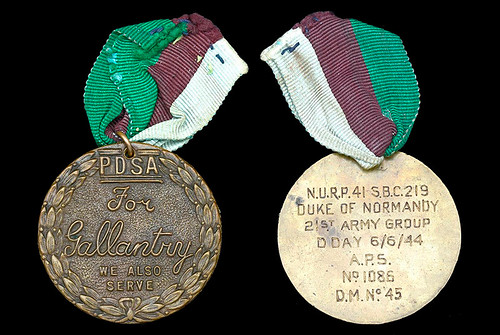
PREV ARTICLE
NEXT ARTICLE
FULL ISSUE
PREV FULL ISSUE
DUKE OF NORMANDY PIGEON DICKIN MEDALWe've often discussed the Dickin Medal, a rare honor given to animals who serve in war zones. Most of the medals have gone to dogs, but awardees include horses, cats and also pigeons. The "Duke of Normandy" pigeon was honored for service during the D-Day landings. We missed the press release before the sale - the medal was auctioned this week at Dix Noonan Webb. Estimated at £6,000-8,000, it brought £22,000 (£27,280 with BP) to a phone bidder. -Editor  The emotive P.D.S.A. Dickin Medal for Gallantry - "The Animals' V.C." - awarded to the cockpigeon 'Duke of Normandy' for his gallantry on D-Day, 6 June 1944 will be offered by Dix Noonan Webb in their online/ live auction of Orders, Decorations, Medals and Militaria on Thursday, April 16, 2020 on their website www.dnw.co.uk. It is estimated to fetch £6,000-8,000. Owned by Gaston Noterman, a naturalised Belgian and master organ builder living and working in Shepherd's Bush, London. ‘Duke of Normandy' was the first bird to arrive home with vital intelligence from behind enemy lines after an epic 26 hours and 50 minutes flight. During the Second World War the Air Ministry maintained a pigeon section that used some 250,000 homing pigeons in a variety of roles, but primarily for sending messages. The Germans used snipers as well as trained falcons to attempt to stop the carrying of messages by pigeons from occupied Europe, and the keeping of pigeons was outlawed in German occupied Europe. However, during the events leading up to and during the D-Day landings pigeons successfully brought back many messages from occupied France on German preparations, defences, and fortifications, and such valuable intelligence, sent from behind enemy lines, undoubtedly saved many Allied lives. The Duke of Normandy, a cock-pigeon, was born in 1941 and was volunteered by his owner to the Army Pigeon Service. After undergoing further training he was assigned to paratroopers of the Anglo-Canadian 21st Army Group, and was dropped behind enemy lines in June with a group of paratroopers tasked with silencing the powerful Merville Battery, which overlooked Sword Beach. As radio silence was crucial to the operations the Duke of Normandy was carried to take back the message that the battery had been taken. Of over 600 men who were dropped, only 150 managed to reach the target, but after fierce fighting the objective was taken with heavy loss. Having spent six days in close confinement in his basket, The Duke of Normandy was duly released and despite bad weather on the morning of his release, gales in the English Channel, and exceptionally heavy rain, the Duke of Normandy made it back to his loft after 26 hours and 50 minutes flying with the news of a successful operation. The Duke of Normandy's time of 26 hours and 50 minutes was beaten by only a handful of other birds taking part in the D-Day landings, the record time being 23 hours and 4 minutes (although the distances flown varied depending upon the location of the pigeons' home loft). However, whilst these other birds had been released some time later, the Duke of Normandy gained the distinction of being the first bird to arrive home from behind enemy lines with news of the Normandy landings. He was presented with his Dickin Medal by Colonel H. Carkeet James, Governor of the Tower of London, in a televised ceremony at the B.B.C. Television Studios at Alexandra Palace in 1947. Instituted by Maria Dickin, C.B.E., the founder of the People's Dispensary for Sick Animals, in 1943, the Dickin Medal has since been awarded on 71 occasions - 32 of them going to pigeons, 34 to dogs, 4 to horses, and 1 to a cat. The vast majority (and all those awards to pigeons) were granted in respect of acts of bravery in the Second World War, but more recently a number of awards have been made to Arms and Explosives Search Dogs of the Royal Army Veterinary Corps for their gallantry in Iraq and Afghanistan. Wayne Homren, Editor The Numismatic Bibliomania Society is a non-profit organization promoting numismatic literature. See our web site at coinbooks.org. To submit items for publication in The E-Sylum, write to the Editor at this address: whomren@gmail.com To subscribe go to: https://my.binhost.com/lists/listinfo/esylum All Rights Reserved. NBS Home Page Contact the NBS webmaster 
|